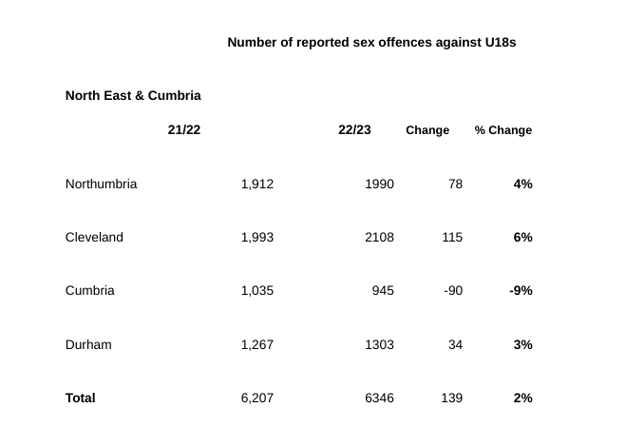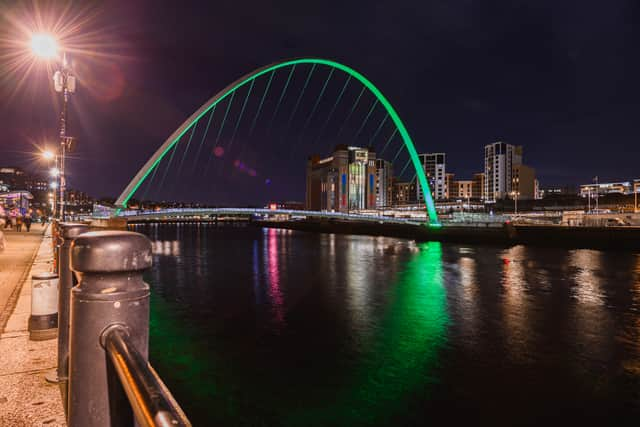Over 6000 child sexual offences recorded in North East and Cumbria over past year
and live on Freeview channel 276
New figures compiled by NSPCC have revealed there have been thousands of child sexual offences in the North East over the past year.
Across the North East and Cumbria show 6,346 offences were recorded by Cleveland, Cumbria, Durham and Northumberland police forces in 2022/23- close to record levels.
Advertisement
Hide AdAdvertisement
Hide AdTypes of offences included rape, sexual assault, sexual grooming and sexual exploitation. The highest number of crimes where age was known were perpetrated against 11 to 15-year-olds.


The Freedom of Information data totalled 86,962 child sexual offences recorded by police across the UK in 2022/23, which remains one of the highest on record since NSPCC started the annual research 16 years ago.
This comes as the NSPCC launches a new campaign in partnership with the Home Office to tackle child sexual abuse. Together they are encouraging the public to contact the charity’s Helpline if they are concerned that a child could be at risk. The partnership also encourages people to report on instances where there are concerns that a child might be experiencing sexual abuse.
NSPCC Helpline is the charity’s free advice line for any adult who may have concerns about a child, including professionals who work with children. The Helpline’s dedicated child protection specialists can advise on a wide range of issues. Adults can contact the Helpline for guidance and support on issues affecting children, as well as for cases of suspected child abuse.
Advertisement
Hide AdAdvertisement
Hide Ad

This new campaign follows a final report released in October 2022 by IICSA (the Independent Inquiry into Child Sexual Abuse). Over seven years, IICSA received evidence and testimonies from thousands of victims and survivors, resulting in a comprehensive set of recommendations which addressed endemic child sexual abuse.
This report found that child sexual abuse and exploitation had been, and remains, under-reported.
In the 12 months following the IICSA report, the Helpline was contacted the equivalent of once every hour with concerns from adults about children being sexually abused.
One parent told Helpline*: “I was in a relationship but this recently ended. My daughter said that she was glad my ex was not around anymore as they were “naughty”. When I asked my daughter why my ex was naughty, she disclosed that they had touched her inappropriately. It seems they had done this at least twice, and my daughter did not tell me because she thought she would get in trouble. I am terrified of what my ex has done to her and need advice on what to do now please?”
Advertisement
Hide AdAdvertisement
Hide AdNSPCC also operates a dedicated Whistleblowing Helpline, which can be contacted for any concerns around child protection issues within the workplace, or other professional organisations.
Childline, the charity’s counselling service, hears directly from children on the impact sexual abuse can have on their lives.
One boy aged 14 told Childline: “I’m still haunted by something that happened in my past. When I was 11, I was assaulted by an older boy at my school. I tried telling my head of year how this boy had touched me without my consent, but they said there was nothing they could do… I was too scared to tell anyone else after that as I worried about getting the same response.”
The NSPCC is calling on the general public, including those who work with children, to use the Helpline to express any concerns they may have regarding a child, even if they are not certain. In doing this, every person can play a part in keeping children safe from sexual abuse.
Advertisement
Hide AdAdvertisement
Hide AdKam Thandi, Helpline Director at the NSPCC, said: “The high numbers of child sexual offences being reported by police forces across the UK are a warning to us all that more must be done to tackle this abuse.
NSPCC also operates a dedicated Whistleblowing Helpline, which can be contacted for any concerns around child protection issues within the workplace, or other professional organisations.
Childline, the charity’s counselling service, hears directly from children on the impact sexual abuse can have on their lives.
One boy aged 14 told Childline: “I’m still haunted by something that happened in my past. When I was 11, I was assaulted by an older boy at my school. I tried telling my head of year how this boy had touched me without my consent, but they said there was nothing they could do… I was too scared to tell anyone else after that as I worried about getting the same response.”
Advertisement
Hide AdAdvertisement
Hide AdNSPCC is calling on the general public, including those who work with children, to use the Helpline to express any concerns they may have regarding a child, even if they are not certain. In doing this, every person can play a part in keeping children safe from sexual abuse.
Laura Farris MP, Minister for Victims and Safeguarding, said: “The protection of children is a collective effort. Every adult must be supported to call out child sexual abuse without fear.
“That’s why we’re supporting the NSPCC and their helplines, to protect children and bring offenders to justice.
“I am committed to stamping out child sexual abuse, which is why we’ve also pledged to introduce mandatory reporting and set up a task force to clamp down on grooming gangs.”
Advertisement
Hide AdAdvertisement
Hide AdThe Government has committed to introduce mandatory reporting of child sexual abuse for relevant roles in England.
Any adults concerned about a child’s safety or wellbeing can contact the NSPCC helpline at [email protected] or by calling 0808 800 5000. Children can contact Childline on 0800 1111 or childline.org.uk.
People should always contact 999 if they suspect a child is in immediate danger.